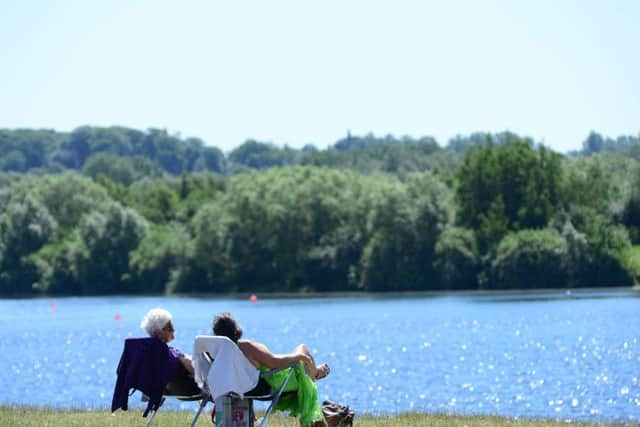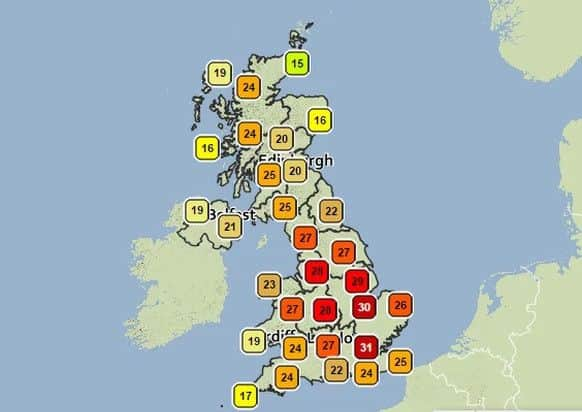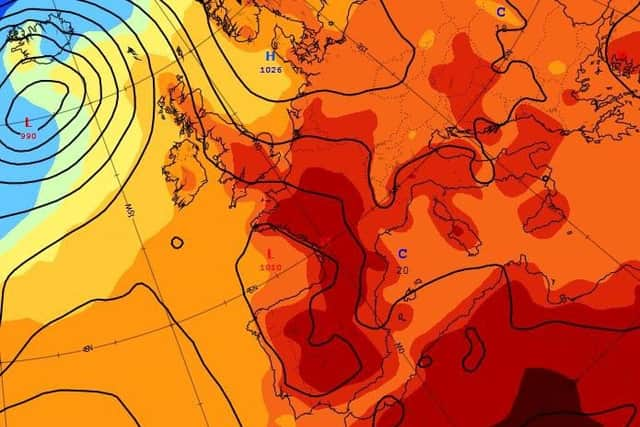Videos: Why your boss should let you leave work early during the heatwave


The heatwave could trigger a national alert and Public Health England (PHE) has urged people to look out for those who may feel unwell in the hot weather after temperatures of 29.1C (84F) were recorded at Heathrow Airport this afternoon.
Dr Angie Bone, head of extreme events at PHE, said the heat could be dangerous for older people, young children and those with serious illnesses, and urged employers to be flexible.
Advertisement
Hide AdAdvertisement
Hide AdShe said: “During very hot weather, pregnant women and people who have chronic illnesses, including cardiovascular, respiratory, renal conditions, diabetes or Parkinson’s disease, may experience discomfort if indoor temperatures are particularly hot and in using public transport.
“Employers should ensure indoor areas are kept cool and consider allowing these individuals to travel to or from their place of work during cooler, or less busy times of the day. For those working or exercising outdoors, strenuous physical exertion during the hottest part of the day should be kept to a minimum.”
Her comments were supported by TUC general secretary Frances O’Grady, who said: “Many people travel to work on overcrowded trains or buses, and doing that during the heatwave will be particularly unpleasant.
“Sensible bosses will allow their staff to work flexibly so that they have the option of varying when they arrive and leave to avoid the sweltering conditions of the rush hour commute.”
Advertisement
Hide AdAdvertisement
Hide AdTomorrow is expected to be even hotter, with temperatures predicted to hit 35C (95F), making a level 3 heatwave alert likely.


The highest recorded July temperature was at Wisley, Surrey, in 2006, where the mercury peaked at 36.5C (98F).
The level 3 alert - one below a national emergency - is triggered when the Met Office confirms a 90% chance of heatwave conditions. When the alert is issued, social and healthcare services must mobilise community and voluntary support for high-risk groups and media alerts about keeping cool are issued.
Professor Paul Cosford, director for health protection and medical director at PHE, said: “Local authorities and the NHS should now be familiar with PHE’s Heatwave Plan, which aims to reduce health risks related to heat. Those looking after schoolchildren or pre-schoolers during the hot spell should ensure they’ve read the guidance in the plan, which includes specific advice on how to keep children safe on very hot days.
Advertisement
Hide AdAdvertisement
Hide Ad“While hot weather is enjoyable for most people and uncomfortable for some, sadly experience tells us that exposure to excessive heat can kill, with most cases of illness and death caused by heart and lung disease. Because we are not used to these very hot temperatures in England, it’s important that local plans are in place to reduce the impact of harm from very hot weather.”


The heat has also caused problems for rail services, with train companies having to cancel journeys or slow them down after Network Rail warned tracks could buckle in the heat.
Several fast trains from London Paddington were cancelled after Network Rail imposed speed restrictions to protect track points.
Some passengers will have to take slower services to Henley-on-Thames and Bourne End, changing at Twyford or Maidenhead.
Advertisement
Hide AdAdvertisement
Hide AdA spokesman for the company said: “First Great Western is advising passengers that due to the anticipated hot weather Network Rail is to impose a speed restriction in the London Thames Valley area to protect track points on Tuesday June 30.


“As a result there will be no fast trains between London Paddington and Bourne End or Henley-on-Thames from 1200 until 2000.”
He emphasised that only six services out of 1,520 had been affected so far.
Health warnings were issued for people suffering from lung conditions.
Advertisement
Hide AdAdvertisement
Hide AdVicky Barber from the British Lung Foundation Helpline said: “During hot weather, the air we breathe has lower moisture levels than usual, which can have a drying effect on our airways. As a result, people with respiratory conditions such as COPD (chronic obstructive pulmonary disease) or severe asthma may find it harder to breathe, feel more tired, or find their lungs feeling heavy or tight.”
She recommended that people with lung conditions avoid going outside at midday, wear loose clothing and drink plenty of water.
The heatwave is being caused by a warm front and tropical continental air mass from Europe pushing across the country, bringing high temperatures, humidity and possibly Saharan sand.


Paul Knightley, forecast manager at MeteoGroup, warned that dust whipped up from the Sahara is being carried by the wind towards Britain where it could coat cars.
TOP TIPS TO SURVIVE IN THE HEATWAVE
Advertisement
Hide AdAdvertisement
Hide AdPublic Health England has issued advice on how people can stay safe in the high temperatures:
• Try to stay out of the sun between 11am and 3pm.
• Protect against sunburn and use on sunscreen of at least SPF15 with UVA protection.
• Wear sunglasses with UV protection to prevent damage to your eyes.
• Wear light, loose-fitting clothing and a hat to keep cool.
Advertisement
Hide AdAdvertisement
Hide Ad• Quench a thirst and drink plenty of cold fluids. If you feel dizzy or develop a headache try and rehydrate, using rehydration sachets from a pharmacy if necessary.
• Do not do too much exercise - use the hot weather as an excuse to take a day off.
• Never leave anyone or an animal in a closed, parked car.
• Keep your house airy - close curtains when the sun is shining and open windows during cooler parts of the day and at night. Turning off non-essential lights and electrical items will also help lower the temperature.
• Muslims observing Ramadan should take extra care and drink plenty of water between fasts.
• St John Ambulance advises anyone who feels unwell during the hot weather to get somewhere cool and rehydrated as soon as possible, and see a doctor if this does not help.